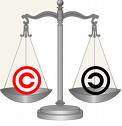 Thanks to Michael Pastore for pointing out this New York Times article by Lewis Hyde, a professor of creative writing at Kenyon College. Professor Hyde quotes Thomas Jefferson:
Thanks to Michael Pastore for pointing out this New York Times article by Lewis Hyde, a professor of creative writing at Kenyon College. Professor Hyde quotes Thomas Jefferson:
“Jefferson especially believed that no generation had a right to bind those that followed. “The earth belongs . . . to the living,” he wrote to Madison in 1789; “the dead have neither powers nor right over it.” That being the case, “perpetual monopolies” in arts “ought expressly to be forbidden,” Jefferson’s own suggestion being that copyright run no more than 19 years.”
and Daniel Defoe:
“Daniel Defoe offered a memorable image for the relationship between authors and their work: “A Book is the Author’s Property, ’tis the Child of his Inventions, the Brat of his Brain.” The line comes from an essay Defoe wrote in support of the first-ever copyright act, the 1710 Statute of Anne.”
and James Madison:
“James Madison explained that copyright is best viewed as “a compensation for a benefit actually gained to the community.” There were good reasons, he wrote, to give authors a “temporary monopoly” over their work, “but it ought to be temporary” ”
in an article about the pros and cons of the Google book settlement.
































The NY Times gets less impressive by the week, with this article being a typical example. The author of this article is utterly clueless about the issues. He claims, for instance, that the revision was made necessary due to “objections raised by the Department of Justice and other parties.” There are hundreds of these “other parties.” Has he read any of them? Does he even know who they are? Does he know what they are saying? Apparently not.
Brandon Butler of the Association of Research Libraries took the time to find that out and to publish a paper on the results. His finding are very interesting. Take, for instance, objections to the settlement and support of it by “class members,” meaning not the long-dead author or publisher of some “orphan” work that this Prof. Hyde would dismiss with a quote from Thomas Jefferson, but living and breathing authors and publishers.
There were no less than 377 such objections, with 295 (78%) of them coming from those outside the U.S. In contrast, there were only 8 authors and publishers who wrote supporting the settlement and none of them live outside the U.S.. Of their objections, this Prof. Hyde has not the slightest clue. Why should he? He’s adopted the politically correct POV that the only real problem with the settlement is that it gives Google a near monopoly. That’s a bit like saying that burglary wouldn’t be a crime if a burglar left the door open as he left, so other burglars could enter easily. A crime for one is a crime for many.
Keep in mind what the professor seems unable to realize, that this settlement isn’t about the relatively small number of books whose author can’t be found with a bit of effort, the real orphans as opposed to the orphans of the imagination. The critical distinction it makes is “commercially unavailable,” meaning out of print. Most books published more than a decade or more ago are out of print simply because there’s no viable market for them in traditional publishing and they came out before print on demand was an option. What Google wants to do is to take and post online and for their profit, all out-of-print books published anywhere in the world without the knowledge or consent of the author. “Copyright be damned” is their basic principle. It really is that simple.
The problem? No copyright law in existence, and certainly none of the international treaties, make this in-print/out-of-print distinction. Out of print simply isn’t a category that affects copyright status, nor is an ability to contact the author. Google’s lawyers aren’t stupid. They know that. They simply assumed, quite rightly, that it’d be easy to deceive the press and, through them, members of the chattering classes–those silly people who believe what they read. And they almost succeeded. Back in May, when the original opt-out-or-be-opted-in deadline was almost reached, there were no almost objections. Now there are hundreds. The truth is out, particularly overseas where the press is less clueless than our NY Times.
Most of these objections come, let me emphasize, from living, breathing authors who are easily contacted and quite vocal. They’re the ones who’ll be hurt by this settlement and they know it.
–Michael W. Perry